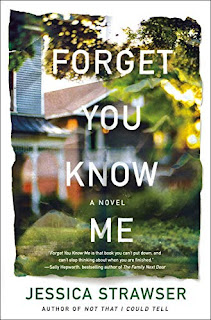By Margaret S. Hamilton
Jessica
Strawser, the Cincinnati-Hamilton County Library Writer-in-Residence, gave a
fascinating workshop at the Main Library on June 8th, during which
she discussed how out of character behavior propels a fiction plot. Strawser
writes women’s fiction with a suspense component, a genre in which unreliable
narrators are commonplace.
Why does
a child bully his classmates on the playground? Does he act out of frustration
or anxiety or is he seeking attention? Or is he cruel, finding satisfaction by
hurting others? Why does a woman knowingly speed through a school zone? Is she
preoccupied or willing to risk a ticket?
After establishing
a character, Strawser stated that a writer can find a good reason for out of
character behavior. She described an example from her first book, Almost
Missed You: Violet’s husband, Finn, takes their child and disappears, the
inciting incident for the novel. In Khalil’s The Hate U Give, a teen
deals drugs to protect his mother. Mr. Darcy is stiff and judgmental in Pride
and Prejudice, struggling to hide his fondness for Elizabeth Bennett. Minny
reaches her tipping point in The Help, and bakes her “terrible awful”
pie.
Strawser summed
up justifying out of character behavior: either something tips the balance or
pushes the character’s button, or the character succeeds in covering up her
predisposition to aberrant behavior until she slips. She gave us some writing
prompts:
No one
knew…
She had
never…
On the
day of his wife’s funeral…
When the
text message came…
But her
pride…
But the
sound of windchimes…
Strawser
used a page-long excerpt from Abby Fabiaschi’s I Liked My Life, during
which Eve struggles to enjoy prom while pondering her mother’s recent suicide.
“Pre-prom is nothing more than a parade of mothers showing off how close they
are with their daughters. The fussing, the makeup, the pictures, it’s all a
performance, and tonight gossiping about my dysfunctional family is the main
act.”
Strawser
emphasized how a person’s speculation about true character plays out:
I thought I knew you. Jay Gatsby turns out to be not at all what he first
seems in The Great Gatsby. Other examples include Fenton and
Steinke’s The Good Widow, Paris’s Behind Closed Doors, and
Belle’s The Marriage Lie.
I
thought I knew myself. Something
happens to impair a reliable character’s judgment in Baldacci’s Amos Decker
series. Additional examples are Scottoline’s Keep Quiet, Drake’s Just
Between Us, and Gardner’s Find Her.
I
know better than to trust you. An
unreliable character tries to do something reliable. Examples include Flynn’s Gone
Girl, Hawkins’s The Girl on the Train, and Ware’s The Woman in
Cabin Ten.
Strawser discussed
an excerpt from Joshilyn Jackson’s The Almost Sisters, as the pregnant
Leia describes her step-sister’s disheveled appearance and bizarre actions:
“Rachel sputtered out mid-profanity when she came into the archway and saw that
it was me. She skidded to a stop just inside the dining room. She was barefoot,
which Rachel never was. With crazy, tangled hair, which Rachel never had. And
two black eyes.”
Strawser
emphasized how and when to apply out of character actions. Who is too
predictable? Who should be more suspicious? Is your protagonist too good or
your villain too bad to be believed? Whose shift might be a good or unwelcome
surprise for the protagonist? Who is tired of playing by the rules? Who is
starting to annoy your reader?
After Strawser’s
workshop, I considered my debut traditional amateur sleuth mystery. Does Lizzie
Christopher act out of character? She surprises herself by showing empathy for
the murder victim and her daughter’s bullying classmate. Her lover and
co-parent struggles with a professional dilemma, which I’ve enhanced a bit to
show he has more on his plate than keeping Lizzie safe. Lizzie’s sidekick,
Officer Bethany Schmidt, grows to appreciate Lizzie’s “outside the box”
insights which lead to identifying and arresting the murder suspects.
Writers,
do you employ acting out of character to enhance your writing? Readers, do you
appreciate out of character moments?


I think out-of-character moments are show extremes, which is what drama is all about. I may have to bookmark your blog, Margaret. Great guidance. Thanks.
ReplyDeleteElaine, it was a terrific workshop which Strawser also presented at the Penn Writers meeting.
ReplyDeleteSounds like a great workshop. Like Elaine, I will have to bookmark this post. Right now I'm thinking of ways my characters can act out of character!
ReplyDeleteGood! It's so obvious when you think about it. We observe people acting out of character all the time...or is it our perception of the way they should be acting?
ReplyDeleteOf course, some people do something and claim it is not their character, "I'm not like that."
ReplyDeleteWarren, it's another form of the character acting out: Bluster bluster "You can't possibly think I had anything to do with it."
ReplyDeleteWell, yes, I do.